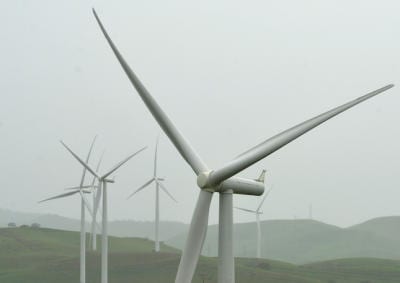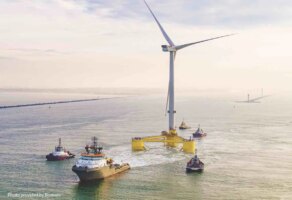An American wind energy company has been fined $US8 million and has agreed to spend as much as $US27 million after it was found guilty of killing at least 150 bald and golden eagles since 2012.
ESI Energy, a subsidiary of NextEra Energy, one of the largest renewable energy generators in the US, entered a plea agreement for violations of the Migratory Bird Treaty Act (MBTA).
It will be fined $US1,861,600 and forced to pay $US6,210,991in restitution to states where its wind turbines accidentally killed eagles.
ESI Energy will also be required to implement $US27 million worth of measures to further minimise and mitigate eagle deaths and injuries, along with further compensation for future eagle deaths and injuries of $US29,623 per bald or golden eagle.
“The Justice Department will enforce the nation’s wildlife laws to promote Congress’s purposes, including ensuring sustainable populations of bald and golden eagles, and to promote fair competition for companies that comply,” said Todd Kim, Assistant Attorney General of the Justice Department’s Environment and Natural Resources Division.
“For more than a decade, ESI has violated those laws, taking eagles without obtaining or even seeking the necessary permit. We are pleased to see ESI now commit to seeking such permits and ultimately ceasing such violations.”
According to the US Justice Department, “ESI pled guilty to three counts of violating the MBTA, each based on the documented deaths of golden eagles due to blunt force trauma from being struck by a wind turbine blade at a particular facility in Wyoming or New Mexico, where ESI had not applied for the necessary permits.”
The relevant permits would have provided ESI with legal cover for accidental eagle deaths, even though NextEra Energy Resources does not believe that the law requires a permit to cover unintentional collisions.
Energy production in the Republican-leaning state of Wyoming is dominated by coal, and renewable energy sources generate only about 15% of the state’s electricity in 2020 – a figure made up primarily with wind farms.
Coal-fired electricity generation is double that of renewables, and while renewable generation is on the increase, this has a lot to do with business and economic pressure, rather than any pro-renewable efforts made by the state.
A 2021 report identified $US1.2 million allocated to the Wyoming Governor’s office that is set aside for the sole purpose of suing other US states that boast laws and regulations preventing Wyoming from exporting its coal, or which force the early closer of coal-fired plants in the state.
“Wyoming is graced with abundant natural resources – including both eagles and strong winds,” said US Attorney L. Robert Murray for the District of Wyoming.
“The sentencing today shows our commitment to both maintaining and making sustainable use of our resources. It also ensures a level playing field for business in Wyoming and ensures those receiving federal tax credits are complying with federal law.”
NextEra Energy Resources president and CEO Rebecca Kujawa took issue with the rulings.
“We disagree with the government’s underlying enforcement policy, which under most circumstances makes building and operating a wind farm into which certain birds may accidentally fly a violation of the Migratory Bird Treaty Act (MBTA) – even when the wind farm was developed and sited in a way that sought to avoid avian wildlife collisions,” said Kujawa.
“The reality is building any structure, driving any vehicle, or flying any airplane carries with it a possibility that accidental eagle and other bird collisions may occur as a result of that activity.
“Unfortunately, the federal government, at odds with many states and a number of federal court decisions, has sought to criminalize unavoidable accidents related to collisions of birds into wind turbines while at the same time failing to address other activities that result in far greater numbers of accidental eagle and other bird mortalities.”
Kujawa said NextEra Energry has invested over $US150 million into avian impact mitigation efforts.
“We have never sited a wind turbine knowing an eagle would fly into it nor have we taken any action in disregard of federal law,” she said. “In fact, our company makes significant efforts to avoid accidental collisions with bird populations, including eagles.
“The MBTA is a 1918 statute that prohibits individuals and entities from pursuing, hunting, shooting, wounding, killing, trapping, capturing, or collecting most US birds.
“NextEra Energy Resources has always maintained, and continues to believe, notwithstanding ESI’s plea, that this statute was only intended to cover intentional behaviour, like hunting and poaching of migratory birds.
“As recently as last year, the federal government had adopted regulations that codified that accidental collisions did not violate the MBTA.”
She said “in order to put this issue behind us”, ESI Energy agreed to plead guilty to three misdemeanours under the MBTA associated with accidental eagle fatalities at three of its subsidiary wind facilities in Wyoming and New Mexico.










